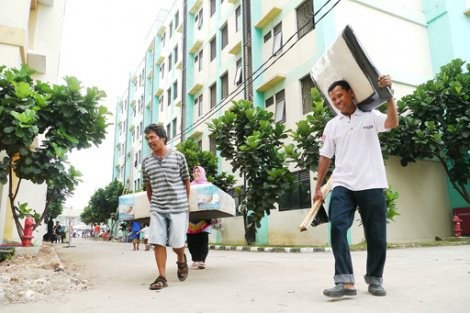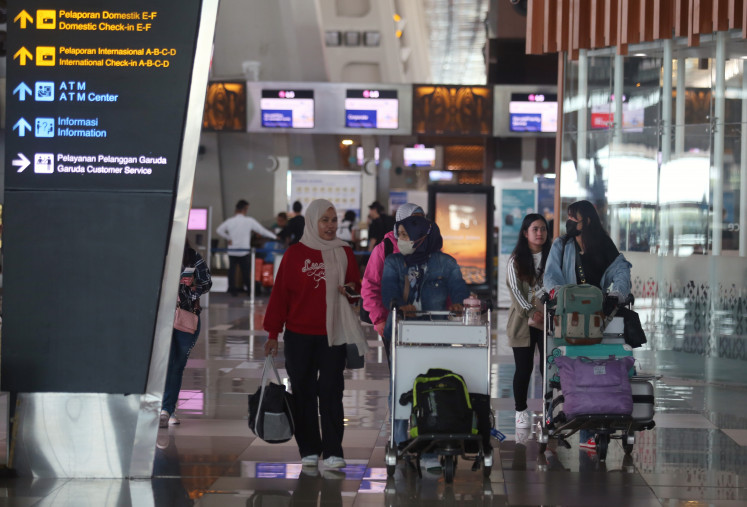Housing key to addressing growing urbanization in RI
As our global population grows, the supply of available land and space is dwindling. By 2030, UN-HABITAT estimates that 3 billion people — about 40 percent of the world’s population — will need access to housing. This means demand for housing in the region increases by an average of 20,000 dwellings a day.
This appeal for housing is most acutely felt in urban areas, and not just in Indonesia. Rapid urbanization is taking place in Asia and the Pacific, with an additional 120,000 people moving into the region’s cities every day.
Change Size
 Squatters from Ria-Rio reservoir carry furniture provided by the city administration to their new residence at the Pinus Elok low-cost apartments in Cakung, East Jakarta, in October, 2013. This year, the Public Works and Housing Ministry will also kick off the construction of Rp 5.7 trillion (US$432 million) worth apartments for low income and middle-class households. (JP /P.J. Leo)
Squatters from Ria-Rio reservoir carry furniture provided by the city administration to their new residence at the Pinus Elok low-cost apartments in Cakung, East Jakarta, in October, 2013. This year, the Public Works and Housing Ministry will also kick off the construction of Rp 5.7 trillion (US$432 million) worth apartments for low income and middle-class households. (JP /P.J. Leo)
M
any families in Indonesia long for a place to call home. More than just a house, a home is a safe haven for our families, a strong and stable place where our children can thrive and a solid foundation on which a family can build a better life. Sharing our homes with family members and friends is a warm Indonesian tradition. Strong and stable homes help build strong and stable communities.
We recognize that a home provides strength, stability and self-reliance for people in our country. While homes vary in appearance across the nation, the need for a home is the same for everyone.
Housing should be a key element in what is being called the “New Urban Agenda”, a United Nations-sponsored declaration of global political commitment being developed by participants worldwide and focused on the sustainable development of cities and other human settlements.
This agenda, evolving out of a series of meetings known as Habitat III, will set a new global strategy around urbanization for the next two decades. The last of three high-level Preparatory Committee meetings that lead to the Habitat III conference in Ecuador in October is being held in Surabaya. While the agenda promotes solid principles at its core, we are calling on our leaders to ensure that four key principles are included.
The New Urban Agenda must: 1) Emphasize adequate and affordable housing, 2) Prioritize security of tenure, 3) Promote community-led development and 4) Set specific and accountable measures of success.
No matter what form a home takes, it also occupies land; a home takes up space. As our global population grows, the supply of available land and space is dwindling. By 2030, UN-HABITAT estimates that 3 billion people — about 40 percent of the world’s population — will need access to housing. This means demand for housing in the region increases by an average of 20,000 dwellings a day.
This appeal for housing is most acutely felt in urban areas, and not just in Indonesia. Rapid urbanization is taking place in Asia and the Pacific, with an additional 120,000 people moving into the region’s cities every day.
By 2050, 70 percent of the world’s population is projected to be living in urban areas. Based on current estimates, that translates to 6.7 billion people (roughly the entire global population in 2010) who will be living in cities. As demand for housing soars, so too do the costs, and homes are becoming less and less affordable for many families by the day.
Left unchecked, rapid urbanization will bring about unfettered growth of slums and other unplanned settlements worldwide as people search for somewhere — anywhere — to reside.
If we stand idly by, billions of people will be denied adequate homes in our lifetimes. Fortunately, a solution is possible — if we act now. The finalized New Urban Agenda document that will emerge from the Habitat III conference must confront the difficult realities of rapid urbanization across the globe. If appropriately drafted, the New Urban Agenda will provide a guide for global efforts toward sustainable and planned human developments that can ensure that all people will live with dignity in our rapidly changing and urbanizing world.
The first draft of the New Urban Agenda promotes to varying degrees the four principles we advocate, but we must ensure they are included in the final version. This agenda will shape the next 20 years of global development, and represents our best chance of making our voices heard. Make no mistake: a principled approach to development is the only way to ensure that we are building healthy, sustainable communities, not simply creating new settlements.
To that end, the New Urban Agenda must:
Recognize that “the expansion of adequate and affordable housing is central to achieving safe, resilient and sustainable cities.” We must call for housing “to be elevated as one of the highest priorities for national governments, and must reaffirm the right to adequate housing for all”. This language is taken from the first draft of the New Urban Agenda, and we call on global leaders to keep it there as new drafts emerge.
Prioritize secure tenure rights, especially for women. This priority should reach all levels of government, creating strong land management institutions at the national and local levels. These institutions must regulate land registration and governance to emphasize fairness and equity. The goals must be to reduce unjust evictions and extortionate payments and to support legally recognized documentation to secure tenure rights.
Create policy environments that harness and enhance public, private and civil society participation. Communities are born from participation and the principles of social inclusion; without these values, development is something that is done to the people, not by the people.
Ensure that efforts to provide healthy and sustainable settlements are working and demand transparency. We live in a data-driven age where it is not enough to receive periodic progress reports that do not measure specific impacts. Only by collecting and sharing data can we learn from our cooperative successes and failures and work together for a better world.
Habitat for Humanity Indonesia is supporting sustainable urbanization programs, such as the Surabaya Urban Housing Development Project. Our ongoing program in the Tegalsari neighborhood of Surabaya will bring a better and healthier standard of living to many households through improvement of 121 houses, construction of 261 private toilets and six public toilets and cleaning of drainage system.
In Indonesia and across the world, we must continue to increase access to affordable housing and sustainable communities until all of us can have the opportunity for an adequate home. The New Urban Agenda sets us on the right track, but we must call on our leaders, in Indonesia and in the Asia-Pacific region, to ensure that the final version reaches the ultimate goal, of a world where everyone has a decent place to live.
***
The writer is national director of Habitat for Humanity Indonesia.
---------------
We are looking for information, opinions, and in-depth analysis from experts or scholars in a variety of fields. We choose articles based on facts or opinions about general news, as well as quality analysis and commentary about Indonesia or international events. Send your piece to community@jakpost.com.








